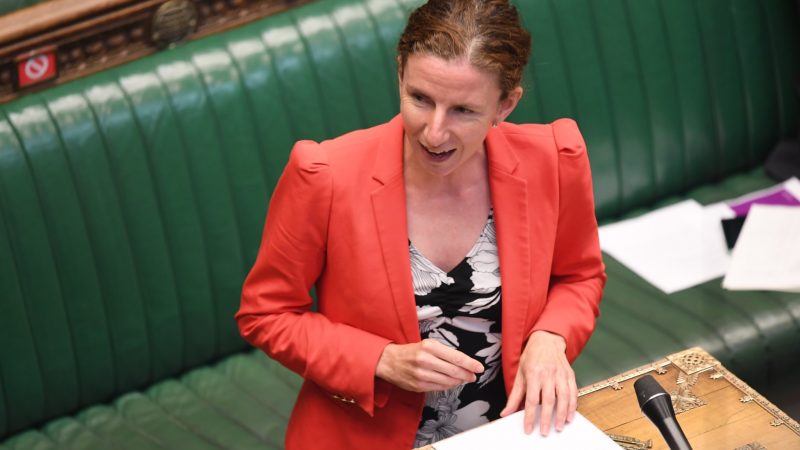
Labour’s Anneliese Dodds has accused Chancellor Rishi Sunak of taking a “sledgehammer” to consumer confidence after his spending review confirmed a pay freeze for millions of public sector workers.
Sunak announced in his statement to the House of Commons this afternoon that reports of a freeze were correct, saying: “I cannot justify a significant across-the-board pay increase for all public sector workers.”
He told MPs that over one million NHS workers would be getting a pay rise, but increases in the rest of the public sector would be paused, although those earning below £24,000 would get a “pay rise” of £250.
As Yvette Cooper raised in the chamber, however, the 2.1 million workers earning under the median wage will face a real-terms pay cut rather than a rise, as a flat rate of £250 is mostly less than the 2% inflation forecast.
The Chancellor also told the Commons that the national living wage would be increased by 2.2% to £8.91 an hour, and that this would be extended to those aged 23 and over, in line with Low Pay Commission recommendations.
He said borrowing would reach £394bn this year, and that the Office for Budget Responsibility has estimated the UK economy will shrink by 11.3%, with output not expected to return to pre-crisis levels until the fourth quarter of 2022.
Responding to the spending review in the chamber, Labour’s Shadow Chancellor said it had been an opportunity to “take responsible choices, protect key workers, secure the economy, recover jobs in every part of our country”.
But Dodds criticised many of the policies announced by her opposite number and their impact on workers, telling MPs: “The Chancellor clapped for key workers – today his government institutes a pay freeze for many of them.”
On the consumer confidence hit, she said: “Firefighters, police officers and teachers will know their spending power is going down, so they will spend less in our small businesses and on our high streets, less in our private sector.”
She argued, as Keir Starmer did in the Prime Minister’s Questions session immediately beforehand, that the government has “wasted and mismanaged public finances on an industrial scale” during the Covid crisis.
Dodds highlighted that companies with political connections have been ten times more likely to win government contracts due to the approach taken amid the pandemic, as revealed by a recent National Audit Office report.
“Photocalls aren’t enough – we need delivery,” Dodds told the Commons, pointing out that no ‘starter homes’ had been built, Northern Powerhouse Rail had not been approved and hospitals in Liverpool and Sandwell were left unbuilt.
The Chancellor’s “rabbit in the hat” spending review announcement was a ‘levelling up’ fund worth £4bn, which will be managed jointly by the Treasury, Department for Transport and Ministry of Housing, Communities and Local Government.
But Sunak specified that local areas would bid for grants directly, which Dodds described as “MPs going to ministers and begging for support for their areas” rather than “change being driven from local communities”.
The Shadow Chancellor said: “So much for taking back control – this is about the centre handing over support in a very top-down manner.” Future criticisms of the centralised scheme will likely refer to the Towns Fund scandal.
Labour called for an inquiry into pre-election allocation of spending after it was revealed that out of 61 areas picked by ministers for the Towns Fund, 60 were in Tory-held seats or Tory targets with an average majority of just 3,000.
Sunak told the Commons the new ‘levelling up’ grants would need to “command local support, including from their MP” but a Treasury spokesperson later clarified that the support can come from councils, mayoral authorities or MPs.
The Chancellor also announced that a new UK Infrastructure Bank would be set up. Dodds welcomed the move, but noted that the government had “lost valuable years” after selling the green investment bank in 2017.
Dodds criticised Sunak’s failure to provide an equality impact assessment, his decision to cut international aid, his silence on the absence of a UK-EU trade deal and his lack of action on Universal Credit.
She asked: “Why is he still refusing to make the speedy fixes to Universal Credit Labour has advocated, which would aid the self-employed? And why won’t he [ensure] the increase in Universal Credit is continued beyond April?”
In response to Labour’s criticisms, Sunak concluded: “I’m confident that in private at least they will recognise the significant investment we are making to project jobs, strengthen our public services and improve infrastructure.”




More from LabourList
Restoration announce recommendations for NEC candidates
‘Factionalism at the top is weakening Labour – and handing a gift to Reform’
‘Europe must stand strong on its own as US security guarantees grow conditional’